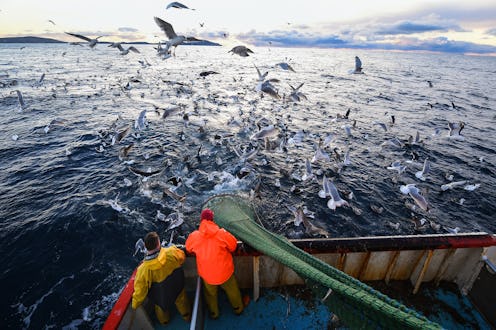Life
The New UN Climate Report Warns Rising Sea Levels Could Change Life In Coastal Cities

On Sept. 25, a United Nations group released a new report detailing how climate change is impacting oceans and other ecosystems — and the human communities that depend on them. The UN's oceans and climate change report revealed some startling findings that demonstrate just how profoundly climate change is affecting the environment. The list below highlights some of these findings — and stresses why it's so crucial to act before it's too late.
As an online Intergovernmental Panel on Climate Change (IPCC) fact sheet described, the report was created with the help of over 100 scientists from 36 different countries. An IPCC press release noted that these scientists reached one overarching conclusion: there's even more evidence that it's crucial to "limit global warming to the lowest possible level." In fact, Eric Schwaab, the senior vice president of the Oceans Program at the Environmental Defense Fund, tells Bustle the report makes it pretty clear that the planet is currently " ... on a trend that will have traumatic implications for aquatic resources and people that depend upon them."
The list below further reflects on some of these traumatic implications — and lays bare the many negative consequences that may result if climate change continues unchecked.
Oceans & Marine Life Are Changing — And Not For The Better
The report found that the world's oceans are profoundly changing due to climate change — and this is having a substantial effect on marine life. Some of these changes include increased ocean temperatures and an increased likelihood of marine heatwaves, decreased oxygen availability in the water, and acidification, among other issues. According to the IPCC report, these changes will likely result in a "decrease in global biomass [overall quantity] of marine animal communities ... and a shift in species composition ... over the 21st century in ocean ecosystems from the surface to the deep seafloor."
Schwaab tells Bustle that these marine life changes have implications for humans as well. He explains that climate change has resulted in changes to fish distribution (the regions in which certain fish species reside) and fish productivity, two things which "have pretty strong implications for not only ocean health but food security for people around the globe." Schwaab adds that, "We have seen some of that already and this report suggests that it will get a lot worse unless we take steps to address carbon pollution and other sources that are contributing to climate change."
Sea Levels Are Rapidly Rising
The IPCC's report also found that, due to the climate change-induced melting of glaciers and ice sheets, the global sea level is rising very fast. IPCC's report overview emphasized that, presently, the global sea level is rising at a rate of 3.6 mm per year — and this rate is continuing to increase.
The group added that the global sea level "could reach around 30-60 cm by 2100 even if greenhouse gas emissions are sharply reduced ... and around 60-110 cm if greenhouse gas emissions continue to increase strongly."
The report emphasized that, if changes aren't made, coastal communities around the world will be substantially more vulnerable to land loss, erosion, and flooding stemming from rising sea levels. In fact, the threat of increased flooding from sea level rise is so substantial that, by 2050, floods that once occurred every 100 years in certain places are now expected to occur almost annually.
Schwaab adds that sea level rise has consequences for marine life, too. "Sea level rise has dramatic impact on aquatic habitats in coastal areas," he tells Bustle. For example, he says that the spawning locations, migration pathways, and juvenile habitats of various marine species can all be affected by changing sea levels.
Arctic Permafrost Is Thawing — And It Could Release Greenhouse Gases
Permafrost (frozen soil) in the Arctic contains a variety of greenhouse gases that are currently "trapped" in solid ice. However, as the IPCC found, due to climate change, this permafrost is thawing at an increasingly rapid rate. As Arctic permafrost thaws, it has the potential to release a substantial amount of environmentally-damaging greenhouse gases into the atmosphere, which could then further contribute to dangerous planet warming.
Melting Mountain Glaciers Are Causing Lots Of Problems
While you might expect that people living in coastal areas are especially vulnerable to experiencing the negative consequences of climate change, it may come as more of a surprise that people living in mountainous areas are susceptible to experiencing climate change-related problems, too.
The report emphasized that the melting of mountain glaciers, snow, ice, and permafrost are putting these communities' lives and livelihoods at risk. This melting " ... is projected to increase hazards for people ... through landslides, avalanches, rockfalls and floods," it noted. Moreover, it added that, as mountain glaciers melt, they affect water availability for people living downstream, which could then have consequences for the health and economic success of those areas. One of the best ways to combat glacier melting problems in mountainous communities, the report suggested, is to stop global warming.
Overall, the IPCC's recent climate report serves as a stark reminder of the profound impact that climate change is having on the planet. If you're inclined to take action after hearing more about the report's findings, Schwaab emphasizes that one of the best things you can do is make climate-smart choices in your own life, including being conscious of your own energy consumption and the amount of pollutants you put into the environment.